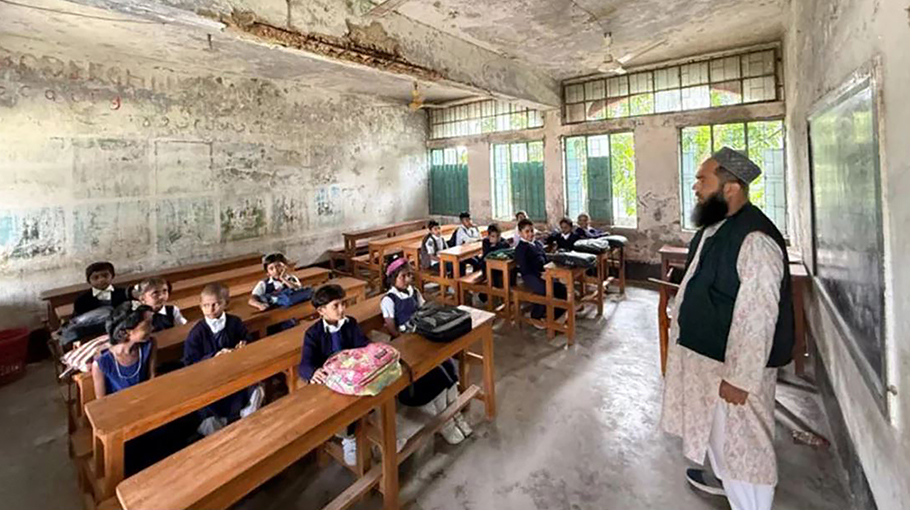Dilapidated school building poses risk to students in Shariatpur

Students at Angaria Government Primary School No. 49, located in Angaria area of Shariatpur sadar upazila, are attending classes with risk as the dilapidated school building can collapse any moment.
Chunks of plaster frequently fall from the damaged roof, and reinforcing rods are exposed in some places. Rainwater leaks through the roof, and cracks have appeared on the walls, pillars, and beams. Even a light touch causes plaster to crumble. Despite these hazards, teachers continue teaching in this precarious building, while parents who send their children to that school, remains in constant fear of accidents.
It was learnt that the dilapidated building is at risk of being collapsed any time, with chunks of plaster missing from the roof and rusted rods exposed. Stains from rainwater leaks are visible, while cracks can be seen on the walls, roof, pillars, and beams. About 250 young students are forced to attend classes at great risk to their safety in such condition.
According to school authorities, Angaria Government Primary School No. 49 was established in 1937 in Angaria area of Shariatpur sadar upazila. Currently, the school has 231 students and 10 teachers. Initially, it had a semi-pucca building. In 1989, the Directorate of Primary Education Engineering constructed a two-story, five-room building, which has now become entirely unsafe. Teachers said that they have repeatedly informed higher authorities about the potential dangers, but no solution has been provided.
Assistant teachers said that the students are unable to focus on their studies due to the constant fear of accidents. Their academic performance is suffering, and attendance is declining.
Rehana Akter, the mother of first-grader Mainuddin Miah, expressed her concerns, saying the school building has visible cracks and exposed rods. She constantly worries about accidents while her child is at school. She also mentioned that in case of an accident, escaping quickly from the building would not be easy. She urged the government to construct a new school building as soon as possible, considering the safety of the children.
First-grade student Tonushree Biswas Piu said, “The upper part of our school is severely damaged. During the rainy season, water and sand fall from the roof. We feel very scared while attending classes. We want a new school to be built.”
Fourth-grade student Sumaiya Akter added, “Sometimes, while we are in class, sand and pieces of brick fall from above. On wednesday, debris fell on my head. It’s very difficult to study in these conditions. I request the government to build a new school building for us as soon as possible.”
Assistant teacher Asma Akter mentioned that the school building has been in a fragile state for a long time. “We are unable to conduct classes properly,” she said. Recalling a past incident, she added, “Previously, a ceiling fan fell due to a broken roof. We are always worried about the students’ safety. Moreover, water leaks into the classrooms, and books and notebooks get wet during rainy days. We desperately need a solution.”
Another assistant teacher, Yunus Sheikh, said, “Students can’t concentrate on their studies because they are always anxious during class. Although the school has a good academic environment otherwise, the unsafe building is causing a decline in the number of students. We urgently need a new building.”
Headteacher Umme Kulsum echoed these concerns, saying, “The two-story building has been in poor condition for a long time, but we are forced to continue our educational activities in this state. A major accident could happen at any time. We have repeatedly informed higher authorities, but we don’t know why the problem hasn’t been resolved.”
District Primary Education Officer Nurul Haque explained that the school had been allocated funds for a new building, but the allocation was canceled for some reason. He assured that the reasons behind the cancellation would be investigated and efforts would be made to secure new funding.
Nurul Haque further said that there is a specific process for constructing new buildings, which involves inclusion in a database. “When allocations are available, we provide support,” he added.



